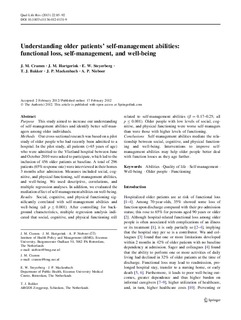| dc.contributor.author | Cramm, J. | |
| dc.contributor.author | Hartgerink, J. | |
| dc.contributor.author | Steyerberg, E. | |
| dc.contributor.author | Bakker, T. | |
| dc.contributor.author | Mackenbach, J. | |
| dc.contributor.author | Nieboer, A. | |
| dc.contributor.author | Erasmus, M.C.U.M.C.R. | |
| dc.date.accessioned | 2018-01-16T12:55:54Z | |
| dc.date.available | 2018-01-16T12:55:54Z | |
| dc.date.issued | 2013 | |
| dc.identifier.citation | Cramm, J., Hartgerink, J., Steyerberg, E., Bakker, T., Mackenbach, J., Nieboer, A. & Erasmus, M.C.U.M.C.R. (2013) Understanding older patients' self-management abilities: functional loss, self-management, and well-being. Quality of Life Research, 22(1), 85-92. | nb_NO |
| dc.identifier.uri | http://hdl.handle.net/11250/2477807 | |
| dc.description.abstract | Purpose: This study aimed to increase our understanding of self-managementabilities and identify better self-managers among older individuals. Methods: Our cross-sectional research was based on a pilot study of older people who had recently been admitted to a hospital. In the pilot study, all patients (>65 years of age) who were admitted to the Vlietland hospital between June and October 2010 were asked to participate, which led to the inclusion of 456 older patients at baseline. A total of 296 patients (65% response rate) were interviewed in their homes 3 months after admission. Measures included social, cognitive, and physical functioning, self-management abilities, and well-being. We used descriptive, correlations, and multiple regression analyses. In addition, we evaluated the mediation effect of self-managementabilities on well-being. Results: Social, cognitive, and physical functioning significantly correlated with self-management abilities and well-being (all p = 0.001). After controlling for background characteristics, multiple regression analysis indicated that social, cognitive, and physical functioning still related to self-management abilities (ß = 0.17?0.25; all p = 0.001). Older people with low levels of social, cognitive, and physical functioning were worse self-managers than were those with higher levels of functioning. Conclusions: Self-management abilities mediate the relationship between social, cognitive, and physical functioning and well-being. Interventions to improve self-management abilities may help older people better deal with function losses as they age further. | nb_NO |
| dc.publisher | Quality of Life Research | nb_NO |
| dc.rights | Attribution-NonCommercial-NoDerivatives 4.0 Internasjonal | * |
| dc.rights.uri | http://creativecommons.org/licenses/by-nc-nd/4.0/deed.no | * |
| dc.subject | Abilities | nb_NO |
| dc.subject | quality of life | nb_NO |
| dc.subject | self-management | nb_NO |
| dc.subject | well-being | nb_NO |
| dc.subject | older people | nb_NO |
| dc.subject | functioning | nb_NO |
| dc.title | Understanding older patients' self-management abilities: functional loss, self-management, and well-being | nb_NO |
| dc.type | Journal article | nb_NO |
| dc.source.pagenumber | 85-92 | nb_NO |
| dc.source.volume | 22 | nb_NO |
| dc.source.journal | Quality of Life Research | nb_NO |
| dc.source.issue | 1 | nb_NO |
| dc.identifier.doi | https://doi.org/10.1007/s11136-012-0131-9 | |

